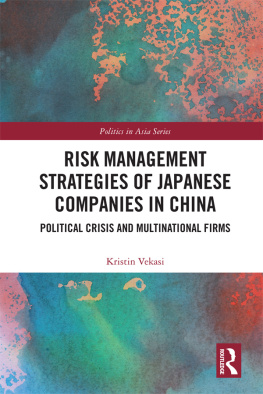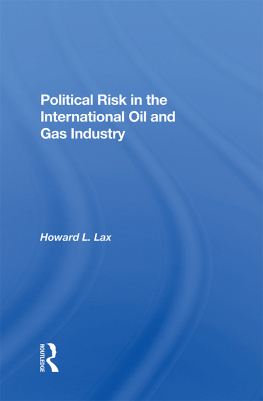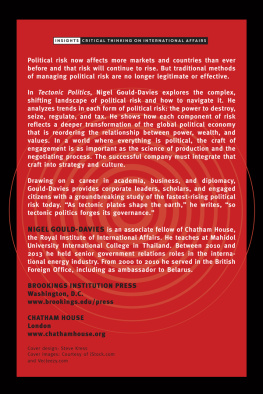A SHORT GUIDE TO POLITICAL RISK
SHORT GUIDES TO BUSINESS RISK, THE SERIES
Risk is a far more complex and demanding issue than it was ten years ago. Risk managers may have expertise in the general aspects of risk management and in the specifics that relate directly to their business, but they are much less likely to understand other more specialist risks. Equally, Company Directors may find themselves falling down in their duty to manage risk because they dont have enough knowledge to be able to talk to their risk team, in a sensible way.
The short guides to risk are not going to make either of these groups experts in the subject but will give them plenty to get started and in a format and an extent (circa 150 pages) that is readily digested.
Published titles
A Short Guide to Ethical Risk
Carlo Patetta Rotta
May 2010, Paperback, 168 pages, 978-0-566-09172-8
A Short Guide to Customs Risk
Catherine Truel
August 2010, Paperback, 144 pages, 978-1-4094-0452-1
Titles in production and development
A Short Guide to Kidnap and Ransom Risk
A Short Guide to Operational Risk
Visit www.gowerpublishing.com/shortguidestorisk for details of the latest titles, sample chapters and help on requesting a standing order.
A Short Guide to Political Risk
Robert McKellar
GOWER
Robert McKellar 2010
All rights reserved. No part of this publication may be reproduced, stored in a retrieval system or transmitted in any form or by any means, electronic, mechanical, photocopying, recording or otherwise without the prior permission of the publisher.
Robert McKellar has asserted his moral right under the Copyright, Designs and Patents Act, 1988, to be identified as the author of this work.
Published by
Gower Publishing Limited
Wey Court East
Union Road
Farnham
Surrey GU9 7PT
England
Gower Publishing Company
Suite 420
101 Cherry Street
Burlington, VT 05401-4405
USA
www.gowerpublishing.com
British Library Cataloguing in Publication Data
McKellar, Robert.
A short guide to political risk. (Short guides to business risk series) 1. Country risk. 2. Risk management. 3. Investments, Foreign-Political aspects. 4. International business enterprises. 5. Business and politics.
I. Title II. Series
658'.049-dc22
Library of Congress Cataloging-in-Publication Data
McKellar, Robert.
A short guide to political risk / by Robert McKellar.
p. cm. (Short guides to business risk)
Includes index.
ISBN 978-0-566-09160-5 (hbk) ISBN 978-0-566-09161-2 (ebook)
1. Risk managementPolitical aspects. 2. International business enterprisesPolitical aspects. I. Title.
HD61.M387 2010
658.15'5dc22
2010021050
ISBN 9780566091605 (pbk)
ISBN 9780566091612 (ebk-PDF)
ISBN 9781409458883 (ebk-ePUB)

Printed and bound in Great Britain by MPG Books Group, UK
Contents
List of Figures
1 Introduction
OVERVIEW
International businesses face unique challenges. Most readers can relate from personal experience. When at home, we take most things for granted: we know how the transport system works; what prices and levels of service to expect when we go shopping or out for dinner; reasonable taxation rates and how much fudging we might get away with; which neighbourhoods to avoid at night; what kinds of behaviour will cause insult or charm; and the limits of the laws tolerance for our more eccentric behaviour. When we travel abroad for a vacation or business trip, even to countries with a broadly similar culture, this baseline knowledge needs to be partially abandoned and re-learned in the local context. We need to quickly adapt to new terrain, laws, and culture, and if we do not, then we become the hazard-prone traveller likely to have a very unpleasant, costly trip and come back more xenophobic than ever.
If we multiply the number of variables and the degree of complexity by several orders of magnitude, we begin to approximate the challenges facing large-scale foreign business operations.
Unlike their more home-bound counterparts, international businesses, those which have engaged in overseas environments in search of new markets, labour, and supplies, face an array of unique challenges. Different local and international regulations need to be taken into account; the social and environmental impact of any operation aside from only (and even then) trading will need to be considered; duty of care becomes more acute given that many staff are far from home at the companys behest; intercultural gaps and misalignments need to be bridged; the limitation or eccentricities of local infrastructure need to be factored into operational plans; health and safety standards need to be adjusted for a new climate; and HQ needs to manage the global-local balance, or risk having an overseas office take on its own identity and strategy.
These are challenges that still confound even the most experienced international players, but even these questions presuppose a level of stability in the operating environment: The familiar rules of the game still apply, however hard the game might be. There is another variable that affects international business operations, and which is more exogenous, less controllable by conventional business practices, and potentially more hazardous: political risk, the subject of this guide.
DEFINITION OF POLITICAL RISK
Political risk can be defined as potential harm to a business operation arising from political behaviour. The next two chapters will explore the issue at a historical and then theoretical level, but we can briefly deconstruct this definition for some conceptual clarity. We will address risk, harm, and political behaviour in turn.
Risk can be defined as potential harm, or hazard. More precisely, a risk refers to a potential event or condition which, if realised, would cause harm or damage to a business. Risk is usually measured in terms of the probability of realisation, and the degree of harm, or impact, which would be incurred if a risk manifested. The intersection of these two independent variables yields the overall severity of a risk.
Three common errors in the interpretation of risk help to define the concept. One is forgetting that the two measures of risk (probability and impact) are independent. If something bad happens the effect might be disastrous, but if the chance of it happening is negligible then overall severity is limited. Conversely, just because something is nearly inevitable, it does not make it a severe risk unless the impact incurred would be relatively serious.
The second error is to equate uncertainty with a low probability. For example, if we have almost no idea about whether or not a risk will manifest, the best reflection is a probability of 50 per cent. This seems like a high score for something uncertain, but indeed it is the only accurate depiction of complete uncertainty: It could go either way. Western intelligence services, as well as commercial risk consultancies, have long struggled with the question of whether or not to assign numerical probabilities to risk, but given differences in personal and linguistic/cultural interpretation of probability indications, a numerical assessment in conjunction with a descriptive indication is the safest bet.
Finally, there is considerable confusion about the difference between risk and a risk. Risk is negative potentiality, or the hazard incurred by being in a particular situation. A risk, as defined above, is a specific potential event or condition, such as a kidnapping or a scandal. We will be applying both usages. Risk as a concept is not the target of this guide, but it is useful to be aware of its implications, and some of the logical challenges it can pose.
Next page








